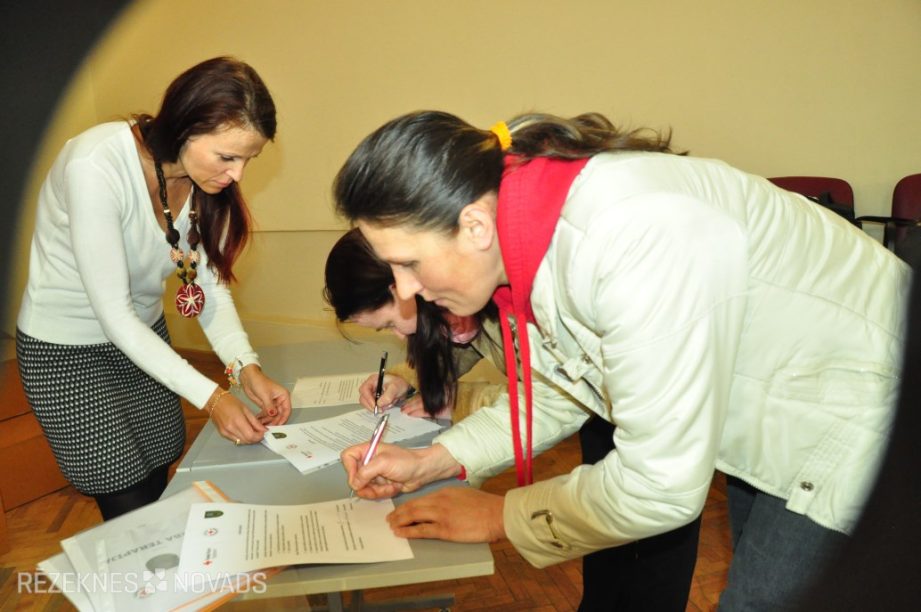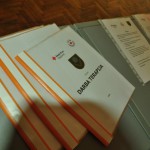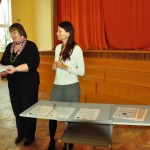Working therapy will help poor families

Twelve poor and multi-child families from Dricānu, Bērzgales, Kaunatas and Mākoņkalna parish have been involved in Latgale in an unprecedented project “work therapy”, which is implemented by the social administration of Rezekne and the Latvian red cross Rēzekne Committee, in collaboration with the Norwegian Oplands region. Each family is given a fixed amount of money – EUR 83 for the establishment and maintenance of a small garden, in order to keep food supplies for the winter. At the beginning of April, all the selected families were invited to sign a contract for engagement.
The families undertake to spend money on the strictly defined objectives, the land handling, the purchase of seed and planting material, the cultivation of mushrooms, the supply of fodder etc. Each purchase or service will have to be accounted for by a check or a drawn-up act signed by the service provider, a recipient, as well as a county social worker or a parish administration manager.
Each family also received a project journal that will record the work done during the year, the purchases made. Silvija Strankale, head of the municipality of Rezekne, encouraged the journal to be supplemented by both photographs and drawings, allowing creative expression to every member of the family, particularly the smallest. Throughout the year, the employees of the social administration have decided to visit the families involved in the project so that they will not only control but also provide support and advice, in August all the families involved in the project are committed to visit project funders, representatives of the Norwegian Oplands region. If lucky, the families of their grown crops could also participate in the traditional rural benefit market in the municipality of Rezekne.
Inga Platonova has agreed to participate in the project. Six children grow up in her family, four of whom learn Dricānu in secondary school, two younger visiting kindergartens. The family is deprived of the poor status. Inga acknowledges that the money granted will be a good return to buy seeds and cultivate land this spring. “We're trying to get our own forces to survive, keep cattle, our garden.” If there is no cow in the countryside, you will not survive. Thank you for not forgetting us. I'm not afraid, i work from childhood, and i teach kids to work. I think we will be discussing what work and the obligation to entrust. '
AS well AS Bērzgales, Lolitai Laureck has already had his own home in which he tries to grow something every year. In the family, two children are already adult, two still studying AT Bērzgales in elementary school, Momma had to leave the job because of health problems, but her hands don't pass. “We'll invest the first money for seed purchase and land processing, then we'll see.” That's going to be a fucking thing to do. Fear is not, we have a very good social worker Nathalie, she will always explain. The main thing is to go, talk, look, solve. "
Lolita emphasizes that one of the pluses of this project is that it will be possible to get more contacts with other families involved in the project. “It's interesting, contact with people, responsibility, isn't that you're sitting at home and you don't need anyone.”
As well as the creation of his little garden, HE is dreaming OF THE parish of Bērzgales, Meldrai Gailane, who brings up five children alone. “The gardens are small, we'll get potatoes, carrots, etc.” Why did i agree to participate? To be something, the garden of the garden itself is different from that of the store. “They'll get the money, then, then they'll see.”
As Mr Silvija Strankale, head of the social administration of Rezekne, pointed out, the project is an opportunity for families to encourage themselves to work more in their own right. The responsiveness has been large, so 12 poor families have been selected instead of the first 10 families, among them both GMI (guaranteed minimum subsistence) and high social risk families.
“At first, the Norwegians wanted to give the soup to the kitchen, but we talked and decided that people would be more involved in this way, because they would not get ready soup plates, but they would grow products for the boiling of the soup. That is why we also thought of this name working therapy," adds Gunta Krukovsky, Chairman of the Rēzekne Committee of Latvia.
The project is also welcomed BY Dricānu parish social worker Ilze Tutāne “it is a good support because it encourages people to work, work, develop. There are many families who need it, but there are also those who do not know what they are waiting for. '
“Of course, such a benefit is a good thing, so that only these families can usefully use it, so there must be permanent controls, maybe all money should not be transferred, but by instalments. There are many families in the baby, who have a really heavy financial situation, but there are also those who have a house, land, but around the house the weeds are growing. If these three families can somehow come back with this little money if they can grow food for winter, then it will not be a drop in the sea,” – says Arvīds Dunsky, head of the parish administration OF Bērzgales.
Anna Rancāne
Autores photo


